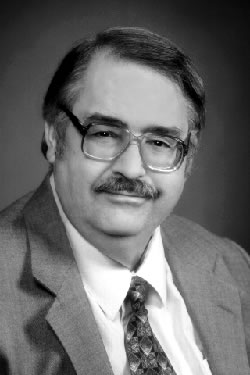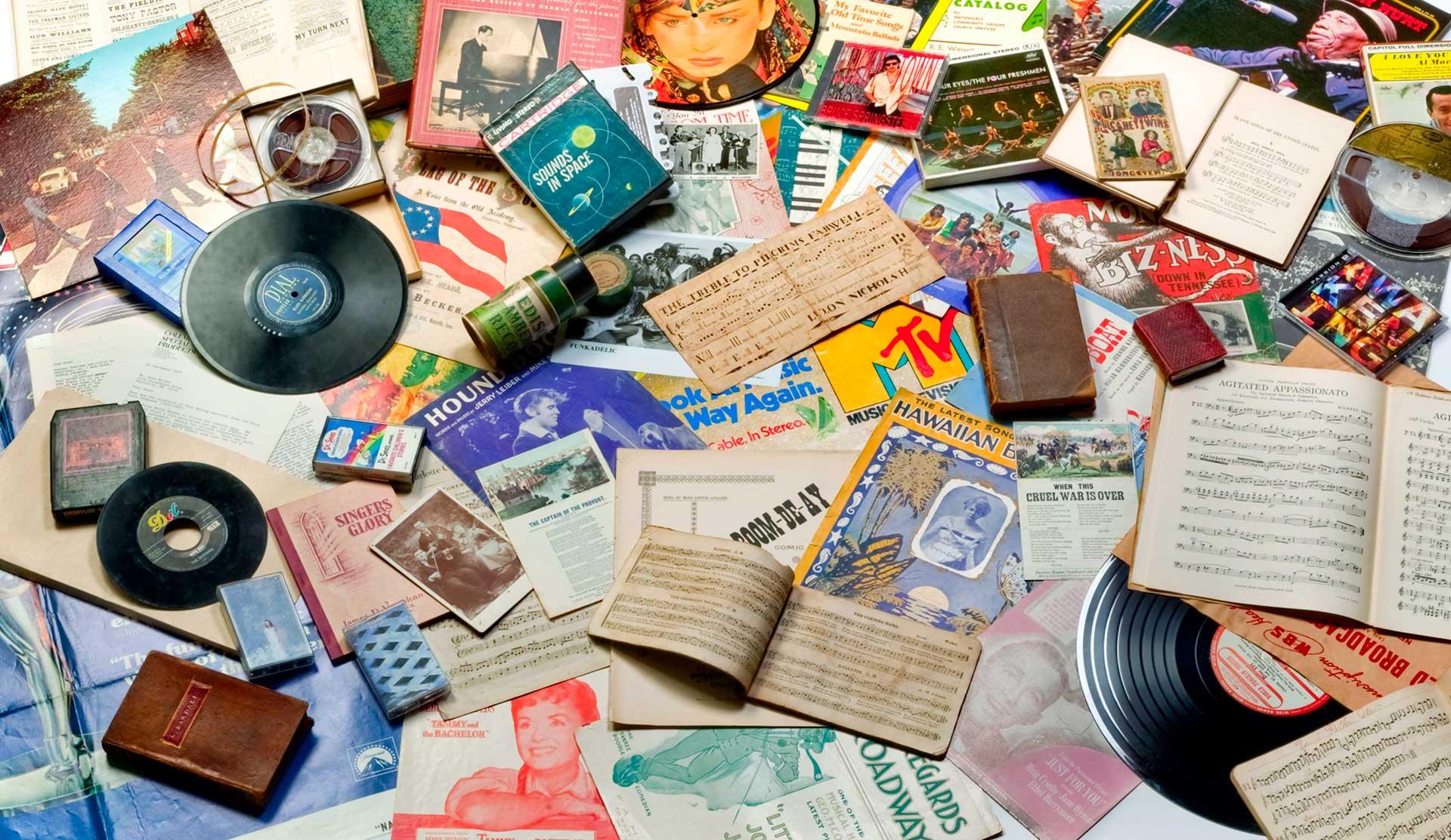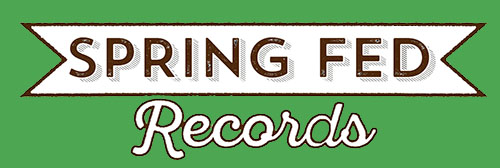Center for Popular Music
Charles K. Wolfe Audio Collection
Introduction
In February, 2012, the family of the late Dr. Charles K. Wolfe (1943-2006) signed a deed-of-gift donating Dr. Wolfe’s collection of sound recordings to the Center for Popular Music (CPM). This was a major bequest, for not only was Dr. Wolfe a prodigiously productive scholar, he was also an obsessive collector of the nation’s popular and vernacular music. The Charles K. Wolfe Audio Collection contains in total 2,601 cassette recordings, 719 open-reel recordings, and an uncounted number of commercial tape releases. Among these are: interviews and field recordings made by Dr. Wolfe and other scholars; small label/vanity pressings of music; field recordings and transcriptions that are commercially available or that can be found in other institutional collections; dubs of rare recordings; and more.
A generous grant from the GRAMMY Foundation enabled the CPM to inventory, organize, conserve, catalog, and digitize much of this collection. The information in this database is the result of that project, which covered the period from 1 April 2013 to 31 March 2014. Detailed information here is found only on the interviews and field recordings, which together total 1,246 cassettes and 333 open-reel tapes.
Search Collection Catalog
Short Biography Audio Samples Project History Use Policy
Dr. Charles K. Wolfe, a Short Biography
Dr. Charles K. Wolfe was born in Sedalia, Missouri in 1943. He was raised in a musical family and became deeply interested in music at a young age. While he devoted considerable time to learning how to play the banjo, guitar, and saxophone during his youth, he later claimed that the typewriter was his best instrument. Wolfe earned his B.A. in English at Southwest Missouri State University and then continued his studies at the University of Kansas, where he earned his Ph.D. in 1971. In 1970, he began his 35-year tenure as a Professor of English at Middle Tennessee State University in Murfreesboro, Tennessee.

Middle Tennessee provided Wolfe with an excellent, centrally located base of operations from which he could easily travel all over the South to meet and interview the pioneers of the gospel and country music he would spend his life documenting and championing. Wolfe was highly prolific scholar who during a long career as a writer, editor, lecturer, and fan of southern vernacular music, wrote scores of articles, reviews, and liner notes, authored (or coauthored) more than twenty books, and appeared countless times as a “talking head” on TV, radio, and in documentary films. He received many honors and awards for his work including an ASCAP-Deems Taylor Award, an Association for Recorded Sound Collections’ Lifetime Achievement Award, the International Bluegrass Music Association’s Distinguished Achievement Award, and he was a three-time GRAMMY nominee. He was also a major supporter of vernacular music community projects throughout the region, such as Uncle Dave Macon Days in his home town of Murfreesboro.
Dr. Charles Wolfe retired from Middle Tennessee State University in 2005 but continued his studies and writing up until his death in February of 2006.
Charles K. Wolfe Audio Collection: An Overview
The majority of the recordings in the collection were created or collected by Dr. Wolfe during his many years of research on American music. The collection consists of approximately 3,000 audio tapes and corresponding paper documents, such as play lists, correspondence, or notes. Items are organized numerically in archival boxes. The collection contains audio tapes in 5” and 7” open-reel format and cassette format.
The Charles K. Wolfe Audio Collection consists mainly of audio tapes relating to the vernacular musical styles of the American south from ca. 1929 to 2006. Styles represented in the collection include: country/old time/string band music, fiddling, blues, classic jazz, folk ballad, blues, western swing, Hawaiian, folk song, shape note singing, the singing school tradition, gospel quartet singing, and rockabilly.
The Wolfe Audio Collection contain oral histories and interviews with many pioneering country and gospel musicians, singers, songwriters, producers, and publishers. Among them are: Bill Monroe, Roy Acuff, Sam and Kirk McGee, Dick Rutherford, Sid Harkreader, Alison Krauss, Art Galbraith, Clyde Davenport, Frank Walker, Ernest Stoneman, Kitty Wells, Maybelle Carter, James D. Walbert, Benny Williams, Louise Woods-Woodward, Clarence Myer, Poplin-Woods Tennessee String Band, Hack’s String Band, Skillet Lickers, Georgia Yellowhammers, Doc Roberts, Dykes Magic City Trio, Perry County Music Makers, Jess Young, Smith’s Sacred Singers, Vaughan Quartet, Taylor’s Kentucky Boys, Uncle Dave Macon, Burnett & Rutherford, Byrd Moore, the Tweedy Brothers, Red Fox Chasers, Stamps Quartet, James D. Vaughan, George Jones, Lefty Frizzell and more. The interviews tend to focus regionally on Middle Tennessee, East Tennessee, North Georgia, Alabama, Missouri, Western North Carolina, West Virginia, Virginia, and Kentucky. Wolfe’s interviews include information on musician’s impressions of other musicians, details of recording sessions, individual performance styles and techniques, influences, memories of other musicians, travelling, songwriting, business aspects, gospel publishing, discographical information, autobiographical and genealogical information, and first-person information on the early histories of the Grand Old Opry, the National Barn Dance, and Renfro Valley Barn Dance.
The Wolfe Audio Collection also features many field recordings, historic radio transcriptions, dubs (and originals) of small label/vanity label recordings and demo tapes as well as copies of similar recordings made by fellow scholars, musicians, and folklorists.
Wolfe Audio Samples
Dick Burnett: Charles Wolfe had a number of opportunities to interview the pioneering string band musician and songwriter, Richard “Dick” Burnett (1883-1977) during his field trips to Kentucky in the 1970s. Burnett made many fine commercial recordings in the 1920s and ‘30s with musicians such as Byrd Moore, John D. Foster and Leonard Rutherford for both the Columbia and Gennett labels. In this short clip, Charles Wolfe speaks with Burnett about his songwriting, his 1913 songbook and Burnett’s authorship of the song “Man of Constant Sorrow.”
Listen to a sample of the Dick Burnett interview
Want to hear more of Dick Burnett? Listen to the entire interview on an interactive PDF.
Lester Smallwood: Along with his liner note and book projects, Dr. Wolfe was also a prolific contributor of scholarly articles on southern music to magazines such as Old Time Music. In this sample, Wolfe chats with banjo player, Lester Smallwood. Smallwood (b. 1900) recorded only one session in Atlanta as a solo banjo player/singer for Victor in October of 1928. This snippet gives a good sense of some of the interesting characters Wolfe encountered during his interviews. In this recording, Smallwood impishly states he could have signed a contract with Victor but that he “I thought too much of my bottles and the women back then.”
Listen to a sample of the Lester Smallwood interview
Kasper “Stranger” Malone: Multi-instrumentalist Kasper “Stranger” Malone began his long and colorful performing career during his teens after having run away from his home near Paducah, Kentucky. During his 77 years as a professional musician, he performed all over the world for silent films, in circuses, cruise ships, on the radio, and with orchestras in concert halls. Malone also worked with country string band musicians in Georgia. In this segment, recorded in 1977, Malone tells Dr. Wolfe about his travels and performances with well-known string band musicians, Clayton McMichen, and Lowe Stokes.
Listen to a sample of the Kasper “Stranger” Malone interview
Roy Acuff: The Charles K. Wolfe audio collection also contains historic interviews conducted by other country music historians and folklorists that Dr. Wolfe used for his research or writing projects. In this interview excerpt, Roy Acuff describes learning how to play the fiddle from his father and other family members as well as picking tunes up for his repertoire from commercial recordings.
Listen to a sample of the Roy Acuff interview
The Charles K. Wolfe Audio Collection Project History
The GRAMMY Foundation-funded Charles K. Wolfe Audio Collection project at the Center for Popular Music proceeded in four well-delineated phases. Phase 1 involved a preliminary organization of the materials and their prioritization. Phase 2 was the bulk of the project and concerned cataloging, metadata development, and database construction and population. Phase 3 saw the conservation and digitization of high-priority tapes. Providing the means to public access of the Wolfe Audio Collection was the issue in Phase 4.
Phase 1
Identification, Inventory
The first part of the project involved developing a preliminary inventory of the tapes, work that was done by a Ph.D. graduate student assistant in the archival management track in MTSU’s Public History program while under the direction of the project archivist, Lucinda P. Cockrell. Criteria for establishing priority generally involved analyzing information gleaned from notations made either on the tape boxes or elsewhere in the collection notes. The tapes were determined to be “high priority” (generally interviews conducted by Dr. Wolfe or other scholars or field recordings made by him or others) or “low priority” (which included small label/vanity pressings of music, field recordings and transcriptions that are commercially available or that can be found at other institutions, dubs of rare recordings, etc. and miscellaneous other items). High-priority tapes came to number 1,246 cassettes and 333 open-reel tapes and were the primary focus of this project. Low-priority recordings numbered 1,355 cassette recordings and 377 open-reel tape recordings and have been placed in the Center’s temperature/humidity controlled storage with a mind to possibly cataloging and digitizing them in the future. In addition, the Wolfe Audio Collection held several dubs of commercial releases, which were uncounted; these were determined to be very low priority and have been stored but with no expectation of future cataloging or preservation.
Phase 2
Phase 2 of the project was the most critical and time consuming. More than one thousand hours of work was devoted to these tasks. In the end, all of the high-priority recordings were processed to archival standards.
Sampling, Cataloging, Archival Labeling, Storage, Metadata, Thumbnail Transcripts
John Fabke, a trained and credentialed archivist (MLIS degree), expert in the field of American folk and oldtime music, and primary project investigator, then proceeded to sample audition each of the high-priority recordings while under the director of the project director (Dr. Dale Cockrell) and the project archivist. Auditioning enabled Fabke to determine content, condition/preservation needs, and relative importance. Inventorying revealed that important work created by scholars other than Charles Wolfe was included in the collection. Examples include: Bobby Fulcher’s work with the Hicks Family and Clyde Davenport; John Hartford’s Missouri fiddle recordings and interviews in Merle Travis, Benny Martin, and others; and work by Tillman Cadle. Recordings of music-making focused on Tennessee, North Georgia, Virginia, Kentucky, Alabama, and Western North Carolina. Genres covered include string band/old time music, regional fiddle traditions, commercial country music of the 1920s-1970s, Southern gospel, blues, jazz, ballads, bluegrass, western swing, cowboy songs, and folk songs. Recorded interviews by Dr. Wolfe and others are of musicians, writers, promoters, DJs, music industry people, recording engineers, producers, and scholars. Interviews with important pioneers of gospel and country music included Dick Burnett, John Booker, Albert Brumley, Lee Allen, Sam and Kirk McGee, Alison Krauss, Bill Bolick (Blue Sky Boys), Tillman Cadle, Charlie Louvin, Grandpa Jones, Kitty Wells, Carl Tipton, the Tennessee Ramblers, Bob Douglas, and many more.
After auditioning and sorting, Fabke cataloged each recording to archival standards, labelled them, and stored each recording according to current archival standards. He entered inventory metadata on each recording into this database and wrote up thumbnail transcripts for the most important interviews.
Database
The Charles K. Wolfe Audio Collection database was populated along the way. Standard database entries were made for:
Collection / Item ID / Format / Title / Creator / Date / Subject / Description / Song Titles / Notes / Series / Performer / Performance Place / Performance Date / Venue / Rights / Scans
Special notations were made in the following categories if pertinent:
Name / Region or State / Style / Instrument / Opry Performer / Time period / Record label / Interview / Performance / Radio Transcript / Contest / Gospel Music / Race / Uncle Dave Macon / Music Business
Descriptive, structural, and administrative metadata was entered into the CPM’s in-house “Sound Recording” database using Inmagic® DB/Text® software.
Phase 3
Conservation, Digitization
The third part of the project involved conserving the high-priority recordings. This phase was the responsibility of the Center’s curator of audio media collections, Martin Fisher. He inspected each tape for its integrity and performed conservation remediation where necessary.
Flat, first-generation transfers were then made, captured as 192 kHz/24-bit uncompressed files that were stored in BWF utilizing BWAV Writer 1.0. These were written to an in-house RAID-5 server, which is redundantly backed-up to LTO tape that is stored off-site. Reference copies for study were be produced as MP3 files and stored as such. Essential metadata was entered into the BWF <bext> chunk for consistent “catastrophic” file identification. This work was in addition to the approximately 150 cassette tapes that Fisher had digitized before the grant period began. He spent 655 hours working on (and digitizing) the Wolfe recordings (or about 33% of his year’s workload), all the while employing optimal archival standards.
Phase 4
Collection Access: Finding Aid, Database, Website
Patron demand for access to the Wolfe recordings—which are legendary in the field—proved to be high and consistent even before the Wolfe Collection finding aid or database became publicly accessible.
The format for the Wolfe Audio Collection finding aid follows the standard CPM template. It was constantly in front of the project investigator and populated along the way. Although the project proposal did not call for the construction of a Wolfe Audio Collection website, those involved in the project came to feel that a website would be the preferred and most useful portal to the materials in the collection.
Hence, welcome to The Charles K. Wolfe Audio Collections website!
Rights and Restrictions
Generally speaking, access to project materials themselves (as opposed to information about them) will continue to be through visits to the CPM Reading Room. If permissions are clear we expect to place the materials on a CPM-controlled streaming site for the use of scholars that have requested them. For more information or questions, please contact the Center for Popular Music at Popular.Music@mtsu.edu or call 615-898-2449.
Credits
The Charles K. Wolfe Audio Collection project has been funded in part by a generous grant from the GRAMMY Foundation®.
Contact Us
Center for Popular Music
Bragg Media & Entertainment Bldg.
Room 140
MTSU Box 41
1301 E. Main Street
Middle Tennessee State University
Murfreesboro, TN 37132
615-898-2449




